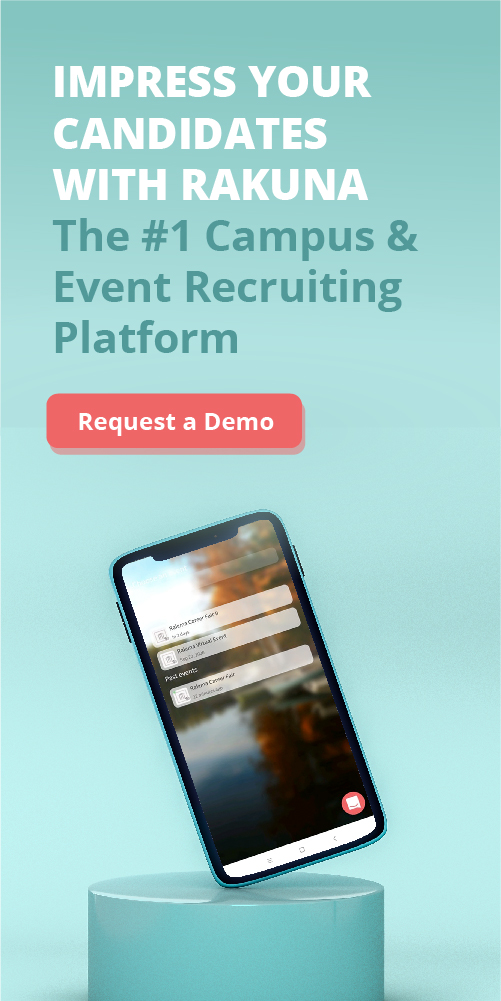Best Practices for Navigating Hiring Laws
Today’s hiring process is a minefield of laws, regulations, and ever-changing legal challenges. Failing to comply can have a wide range of consequences, none desirable, and many very expensive.
A common practice like accepting paper career fair resumes at offline recruiting events that seemed to be straightforward in the past suddenly becomes questionable for many employers, especially those who fall under the scrutiny of OFCCP (Office of Federal Contract Compliance Programs).

A survey by Direct Employers Association, an employer-driven association focusing on talent acquisition and inclusion, shows that about one-third of employers do not accept paper career fair resumes due to concern about the OFCCP recordkeeping requirements and the cost/ hassle of scanning these resumes into their companies’ Applicant Tracking System.
Most employers, whether accepting paper resumes or not, try to push all who come to the event to apply online to be considered. They only use the contact information on the resumes to follow up with all candidates or match their applications as being from the career fair for accurate source tracking.
First of all, let’s clarify the OFCCP requirements and how they impact the practice of accepting paper career fair resumes. The OFCCP’s final rule on the definition of Internet Applicant, which went into effect on February 6, 2006, defines an “Internet Applicant” as an individual who satisfies all four of the following criteria:
- The individual submitted an expression of interest in employment through the Internet or related electronic data technologies;
- The contractor considered the individual for employment in a particular position;
- The individual’s expression of interest indicated that the individual possesses the basic qualifications for the position;
- The individual, at no point in the contractor’s selection process prior to receiving an offer of employment from the contractor, removed himself or herself from further consideration or otherwise indicated that he/she was no longer interested in the position.
Keep in mind an internet applicant must satisfy all four of the criteria. The real key in the definition as provided by the U.S. DOL above is “particular position,” meaning that the candidate must express interest in a single job opening. From a compliance standpoint, accepting career fair resumes is absolutely encouraged by the Department of Labor.
In fact, the OFCCP clearly states on their website that 1) accepting resumes is acceptable, and 2) resumes do not have to be retained so long as prospects are NOT considered for a single position AND are directed back to the career website to apply. In other words, consistency in process execution is key here. If a contractor has a policy of recruiting candidates to apply online, all job seekers, including those at job fairs, should be instructed to apply online.
Establishing this protocol will prevent the OFCCP from interpreting the situation as one where an individual’s credentials are considered at the job fair, which could make the individual an “applicant” who falls under the applicant recordkeeping requirements.
The OFCCP also explained that Campus recruiters only need to retain records if they meet with students to discuss a specific job. A general discussion of the company, types of jobs, skills it wants, and so on won’t lead to a records retention requirement, so long as the recruiter “advises all students that job seekers must apply through the contractor’s web site to be considered for particular positions.”
If the Internet Applicant recordkeeping standards apply to hiring for a particular position and the contractor receives paper resumes for the position from job seekers at a career or job fair, does the contractor need to retain the paper resumes received?
The contractor needs to retain resumes only if it considers resumes received at the job fair for a particular position. The contractor need not retain any resumes if its consistently applied practice is not to consider paper resumes received at a career or job fair. For example, the contractor would not need to retain paper resumes offered at a job fair if it does not consider them and instructs all job seekers to post their resumes on the contractor’s website and/or apply for particular positions on the website.
The contractor should take care to apply such a protocol in a uniform and consistent fashion. It is the contractor’s actual practice that determines whether the contractor has considered a resume. For example, if a contractor’s policy is to accept resumes only through its website, but its actual practice is to consider resumes received at a career or job fair as well, the contractor will be expected to retain both the resumes collected at job fairs as well as those submitted through the contractor’s website.
Must a contractor retain resumes when the contractor’s representative meets with students on campus recruiting trips to discuss general jobs for which a student may be qualified if the contractor advises all students they must apply through the contractor’s website to be considered for a particular position?
A contractor must retain resumes for any job seeker it considered for a particular position. If a contractor’s representative meets with students to generally discuss the types of positions available with the contractor and advises all students that job seekers must apply through the contractor’s website to be considered for particular positions, then the contractor is not considering the students for a particular position during the college recruiting visit and their resumes need not be retained. The contractor should take care to apply such a protocol in a uniform and consistent manner. It is the contractor’s actual practice that determines whether a contractor has considered a resume.
Source: https://www.dol.gov/ofccp/regs/compliance/faqs/iappfaqs.htm#Q15RK
Now as we have cleared up OFCCP’s implications for the practice of accepting resumes at career fairs, here are a few practical tips for companies to consider to help deal with the legal minefield and inevitable paper avalanche to follow:

Career Fair Resumes Retention Strategy
First things first: having a clear resume retention strategy in place is essential. Retaining recruitment documents is not optional; it’s the law. Federal record retention guidelines dictate that solicited or unsolicited resumes must be retained for a certain period. This retention period can vary, ranging from a week to three or more years, depending on various factors.
At Rakuna, we understand the importance of compliance and data retention. Our platform allows companies to retain candidate data until an official request is made to remove it from our system. This ensures that companies can retain necessary information for as long as they need, all while adhering to legal requirements.
Implementing an Effective Strategy
To ensure compliance and streamline your resume retention process, it’s crucial to educate your recruiting team about federal record retention guidelines. Ensure everyone knows the legal requirements and how to handle and store career fair resumes appropriately.
Additionally, it’s essential to have a systematic approach to adding career fair resumes to your organization’s database. This includes:
- Collection Process: Establish a straightforward process for collecting resumes during career fairs and other recruitment events. Ensure that all recruiters know how to gather and document this information correctly.
- Storage System: Implement a secure storage system for career fair resumes, whether a digital database or a physical filing system. Ensure the system is easily accessible to authorized personnel and complies with data protection regulations.
- Retention Period: Determine the appropriate retention period for different types of resumes based on legal requirements and organizational needs. Keep track of when career fair resumes were received and when they should be disposed of accordingly.
Being Organized
If you do not use a technology solution like Rakuna, you will want a “system” to stay organized.
For recruiters who prefer a manual approach, employing organizational tactics such as colored binders can be incredibly effective. Assigning specific colors to different categories, such as urgency or suitability, provides a visual cue easily understood by all team members, even those who may be joining at the last minute.
However, it’s essential to recognize the limitations of paper-based systems. Writing notes directly on career fair resumes can pose legal risks, as these documents are discoverable and can be turned into lawsuit hazards.
To mitigate this, consider a uniform method & software for capturing candidate info and recruiters’ evaluations where all collected data are available on a single platform.
Why should my team do it, you asked? Here’s why:
- Utilizing technology streamlines the evaluation process and ensures compliance with data protection regulations. Instead of writing directly on resumes, recruiters can capture candidate information through a mobile app or digital platform.
- By taking photos of resumes and inputting evaluations into a centralized database, recruiters can maintain consistency and uniformity in their assessments. This approach not only minimizes legal risks but also allows for faster decision-making and the sharing of feedback among team members.
Ultimately, using colored binders or adopting a mobile app, the goal here is to have a streamlined system that enables recruiters to generate accurate recruiting data, recruit faster, and improve candidates’ experience.
Collect Recruiters’ Analysis
One of the many advantages of sending your staff to career fairs is the insights they can collect on each prospect they meet with.
Right now, the most common strategy for most companies to capture a recruiter’s comments and thoughts on each candidate is to use a preprinted paper having only check boxes with specialized job-related terms or some standard candidate assessment forms prepared by your recruiting team to create a more consistent and thereby defensible candidate evaluation process.
With Rakuna’s campus & event recruiting solution, your recruiting team will have the same ability to create customized evaluation forms to reflect your company’s proprietary campus recruiting process and ensure a standardized candidate assessment across your company representatives and recruiters.
Going Digital (And Going Green)
With the fast-paced recruitment landscape, there is hardly any room for color-coded folders and giant stacks of paper resumes. As helpful as these tips for manual data management can be, they can quickly go derelict in the next five years once someone invents a software or mobile app to do the job with triple the efficiency.
Instead, recruiters are going digital with campus recruitment solutions like Rakuna to handle talent acquisition at career fairs.
Tackling Manual Tasks
Gone are the days of sorting through green, yellow, and red folders. With recruitment software like Rakuna, recruiters can now streamline the process with mobile-friendly digital resume capture & candidate data management to produce insightful metric reporting for your talent acquisition leaders.
Keeping It Compliant and Collaborative
But it’s not just about convenience—it’s also about compliance. With Rakuna, we can ensure that recruiters stay organized and adhere to federal record retention guidelines. A readily available digital platform also encourages seamless collaboration among recruiters and hiring managers, making team efforts smoother than ever.
ABOUT RAKUNA

Rakuna is revolutionizing campus recruiting by providing top employers with innovative tools to attract and hire young talent. Our comprehensive platform includes Rakuna Recruit, a user-friendly mobile app for recruiting events, and Rakuna Recruit Dashboard, a candidate relationship management dashboard tailored for campus recruiting.
We specialize in helping companies connect with millennials, offering cutting-edge solutions to streamline recruiting operations and amplify recruiting marketing efforts. From Fortune 500 companies to leading universities, organizations trust Rakuna to find the right talent for their needs.
To learn more about our platform and how we can assist with your recruiting needs, contact us at [email protected] or book a FREE demo today!

